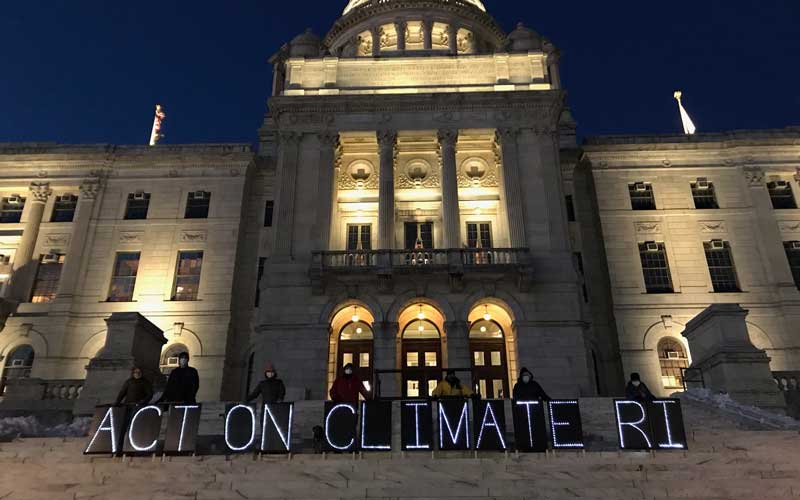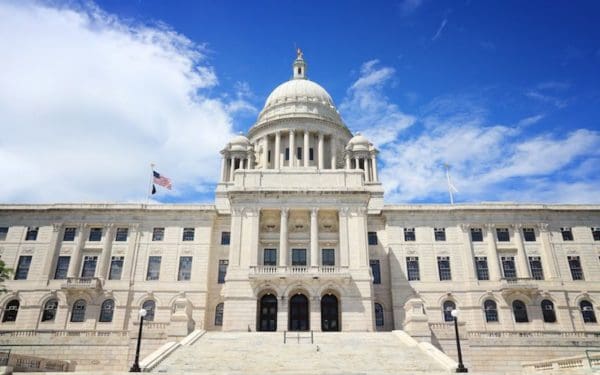
Rhode Island advocates urge their legislators to act on climate. Photo Credit: Climate Action RI (350 RI)
UPDATE: Last week, the Rhode Island legislature passed the Act On Climate 2021 bill, which will put the state on track to lowering its climate-damaging emissions and help Rhode Islanders benefit from the transition to a clean energy economy. After a final review from both the House and Senate, the bill will go to Governor McKee to sign into law.
Four out of six New England states have strong climate laws on the books. But Rhode Island lags behind. The Ocean State’s climate law – the Resilient Rhode Island Act of 2014 – is woefully out of date and has failed as a guide for how to combat climate change in our state.
The Act On Climate 2021 bill (H-5445, S-78) will change that. This bill updates the Resilient Rhode Island Act to align with the latest science. It also adds accountability, transparency, and equity – giving Rhode Islanders insight into what state leaders are actually accomplishing while ensuring an equitable transition to a clean energy economy for all of our communities.
This bill is long overdue. It will ensure Rhode Island slashes its polluting emissions and help our state reap the rewards of an economy run on clean, renewable energy.
What Problem Will Act On Climate 2021 Solve?
To avoid the worst impacts of climate catastrophe, we must cut our carbon pollution to net zero before 2050. To do this, we must stop burning fossil fuels – and soon.
Rhode Island isn’t ready to make this shift. The 2014 Resilient Rhode Island Act is out of date when it comes to climate science, and it has failed to meaningfully cut our climate-damaging emissions. It established the Executive Climate Change Coordinating Council to carry out this work, but there is no accountability mechanism to make sure the Council acts. Nor does it provide for updated climate plans or annual reporting of emission reductions.
The 2014 law left Rhode Islanders on the hook to experience increasingly severe climate impacts with not much information on what the State was doing about it.
For years we’ve been trying to fix this problem – but our legislators have been reluctant to step up. Now, the law needs a refresh to ensure Rhode Island not only does its part to fight climate change, but also supports all of its communities along the way.
What’s at Stake?
Climate change impacts in Rhode Island are growing. From more extreme weather to sea level rise, we are increasingly at risk. Last year tied as the hottest on record – and Rhode Island is the fastest-warming state in the lower 48. The waters off our coast are being hit particularly hard. Changing temperatures in Narragansett Bay have driven our traditional commercial fish species north while replacing them with warm water species.
It’s past time for us to act. We need to pass the Act On Climate 2021 bill to update the Resilient Rhode Island Act to tackle this challenge.
What’s the Solution?
We need to pass the Act On Climate 2021 bill. Here’s why:
- It follows the latest science. The bill updates our climate targets based on what’s needed to avert disaster. It creates achievable targets every ten years, mandating the state cut climate-damaging emissions by 45% by 2030 and 80% by 2040, with the ultimate target of reaching net-zero emissions by 2050.
- It introduces transparency. Every five years, the Executive Climate Change Coordinating Council will be required to issue public plans on how Rhode Island will meet its emission reduction targets. All of us in Rhode Island will be able to comment on these plans, and the Council will address feedback from its advisory bodies. A public dashboard to track our emissions reductions and sources of energy will add another layer of visibility into the State’s progress.
- It fosters an equitable transition. To ensure no one is left behind in our transition to a clean energy economy, the bill ensures the Council’s work incorporates plans for an equitable transition for environmental justice communities. This includes identifying support for workers as well as developing programs to recruit, train, and retain women, people of color, Indigenous people, veterans, formerly incarcerated people, and people living with disabilities in jobs related to a clean energy economy. The bill also requires a process where folks from environmental justice communities can influence the plans.
- It adds accountability. Critically, this law makes the State’s greenhouse gas emissions reduction targets legally binding. If the State fails to follow the law, a court can enforce it. This accountability is absolutely necessary to ensure we meet our emission reduction targets.
Want to Help?
Contact your legislators (you can look them up here) and encourage them to support the 2021 Act On Climate bill (S-78 by Senator Dawn Euer and H-5445 by Representative Lauren Carson). Even just a few people reaching out can have a huge impact!
Passing this bill will put Rhode Island on track to lowering our climate pollution and preparing our communities for the future.



